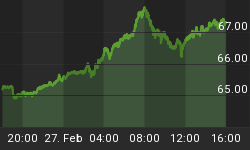Treasury interest rates have been climbing incessantly over the past couple of years, and so have mortgage rates. MND mortgage rate now stands at 4.70 percent, a sharp rise compared to the 2016 MND average rate of 3.43 percent.
Naturally, you would expect loan and mortgage refinancing activity to be on a decline since such deals would essentially mean replacing a cheaper loan with a more expensive one. In fact, very few such deals make sense at these levels, and refi activity should be somewhere in the low-to-mid-single-digit range. Mortgage refinancing makes plenty of sense when rates are falling and the owner is able to replace a loan with a higher interest rate with a cheaper one.
While mortgage refi rates have declined to an 8-year low, activity is still at an astonishingly high 36 percent. In other words, 36 percent of all new mortgage applications are refis.
Housing ATMs Back in Vogue

(Click to enlarge)
Source: MarketWatch
If that sounds bad enough, then news that people are cashing out their expensive new loans to pay bills at record levels should be downright alarming. Why? Because the last time that happened it did not end up well. In fact, it ended in one of the worst financial catastrophes in recent memory.
But how does that work in the first place? Related: Goldman’s Crypto Trading Desk Is Just The Beginning
Cash-out refinance involves a situation where a homeowner gets a new, bigger loan to replace the old one and then takes the difference in cash. For instance, a homeowner who still owes $100,000 on a $200,000 house may decide to refinance the mortgage at $125,000 and cash out the $25,000 difference. The homeowner is at liberty to spend the $25,000 cash whichever way he chooses, including:
• Consolidating more expensive forms of debt such as credit cards
• Investing in a business
• Making discretionary purchases including buying luxury items like boats or taking vacations
Option #1 might be a sound one--especially if you risk defaulting on your bills, damaging your credit score and paying heavy penalties that far exceed the interest rate being charged on the new mortgage.
Option #2 might work if the person knows what he or she's doing. In fact, in business there's something called a carry trade where a person borrows money at a lower interest rate to invest it in a venture that will bring a higher return.
Carry trades are very common in forex. Unfortunately, most businesses involve taking considerable amounts of risk. Unless you are buying assets like fixed-rate high-quality bonds or Treasuries, you risk losing your money. And, certainly buying cryptos like bitcoin does not make the cut because that's 100 percent speculative.
Option #3 never makes sense. Ever. Tapping out your home equity while refinancing to make discretionary purchases or go for vacations is hard to justify when interest rates are falling let alone when they are climbing.
Lessons Learned from the Past
According to Freddie Mac, the proportion of cash-out mortgage refis rose to the highest level since 2008 during the fourth quarter of 2017.
Related: The Five Most Important Blockchain Trends In 2018
With American households steeped deep in debt, there's a high likelihood that people are cashing out their refis to pay debts. Though not exactly economically productive, it's still a better use of the cash compared to homeowners a decade ago who blew most of the money on splashy purchases.
Hopefully, both consumers and bankers still remember lessons learned from the last crisis that refinancing, not home-buying, was largely responsible for the housing bubble and eventual bust.
By Alex Kimani for Safehaven.com
More Top Reads From Safehaven.com:
















